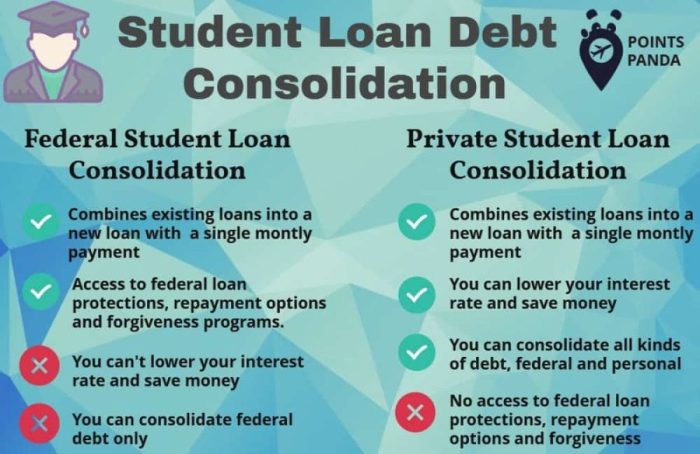
Navigating the complexities of student loan repayment can feel overwhelming, especially when dealing with a mix of federal and private loans. Student loan consolidation, the process of combining multiple loans into a single payment, offers a potential solution. This comprehensive guide explores the intricacies of consolidating both federal and private student loans, examining the benefits, drawbacks, and crucial considerations involved in making this significant financial decision. Understanding the differences between federal and private loan consolidation is key to making an informed choice that aligns with your individual financial circumstances.
This guide will delve into the specifics of each loan type, outlining the steps involved in the consolidation process for both federal and private loans. We’ll also analyze the impact on your credit score, explore various repayment options, and highlight potential risks to help you make a well-informed decision. Ultimately, the goal is to empower you with the knowledge necessary to approach student loan consolidation with confidence and clarity.
Impact on Credit Score

Consolidating your student loans can have a significant impact on your credit score, but the effect isn’t always predictable. The outcome depends on several factors, including your current credit history, the type of consolidation you choose, and how you manage your consolidated loans afterward. Understanding these factors is crucial for making an informed decision.
Consolidation can affect your credit score both positively and negatively. A positive impact might result from simplifying your debt management, leading to improved on-time payment behavior. Conversely, a negative impact could occur if the consolidation process results in a hard inquiry on your credit report or if the new loan terms lead to increased debt and longer repayment periods.
Credit Score Changes Following Consolidation
The impact of student loan consolidation on your credit score is multifaceted and depends on several interacting factors. It’s not a simple case of an automatic increase or decrease. Rather, the change reflects the interplay of several elements within your credit profile.
- Average Age of Accounts: Consolidation can lower the average age of your credit accounts if your older loans are replaced with a new, younger loan. A younger average age of accounts can slightly lower your credit score, as lengthier credit history generally signifies greater creditworthiness.
- Credit Utilization Ratio: While consolidation doesn’t directly change your total debt, it can affect your credit utilization ratio if your consolidated loan has a higher credit limit than the sum of your individual loans’ limits. A lower utilization ratio (the percentage of available credit you’re using) is generally beneficial for your credit score. Conversely, if your consolidated loan’s credit limit is lower than the sum of your individual loans’ limits, it could negatively impact your credit utilization ratio, potentially lowering your score.
- Number of Accounts: Consolidation reduces the number of open credit accounts. While this can sometimes slightly lower your score (as a diverse credit history is generally viewed positively), the benefits of simplified debt management often outweigh this minor negative impact.
- Payment History: This remains the most significant factor affecting your credit score. Consistent on-time payments on your consolidated loan are crucial for maintaining or improving your score. Late payments after consolidation will negatively impact your score, regardless of the initial impact of the consolidation itself.
- Hard Inquiries: Applying for a new loan for consolidation will result in a hard inquiry on your credit report, which can temporarily lower your score by a few points. However, this impact is usually minor and temporary, diminishing over time.
Examples of Positive and Negative Impacts
Let’s illustrate with examples. Imagine Sarah, who has several federal student loans with varying interest rates and due dates. Consolidating these into a single federal loan with a lower, fixed interest rate simplifies her payments and improves her organizational efficiency. This scenario is likely to have a neutral or slightly positive impact on her credit score, primarily due to the improved payment management. However, a hard inquiry will temporarily lower her score.
Conversely, consider John, who consolidates his private student loans into a single loan with a significantly higher interest rate and a much longer repayment period. While this simplifies his payments initially, the increased debt and extended repayment timeframe could negatively affect his credit score over the long term, especially if he struggles to make consistent on-time payments.
Impact of Different Consolidation Methods
Federal and private loan consolidation methods affect credit reporting differently. Federal consolidation generally results in a single new loan reported to credit bureaus, potentially impacting the average age of accounts and number of accounts. Private loan consolidation similarly results in a single new loan, but the impact can vary based on the lender’s reporting practices. Both methods will likely result in a hard inquiry. The key difference lies in the terms and conditions of the consolidated loan, which significantly influence the long-term impact on the credit score through factors like interest rate, payment amount, and repayment duration.
Repayment Options and Strategies
Consolidating your student loans, whether federal or private, significantly impacts your repayment journey. Understanding the various repayment plans available and selecting the one that best aligns with your financial situation is crucial for successful debt management. This section will explore different repayment options, highlighting their advantages and disadvantages to aid in making an informed decision.
Available Repayment Plans After Consolidation
After consolidating your student loans, several repayment plans become available, each with its own terms and conditions. The best choice depends heavily on your income, expenses, and long-term financial goals. Choosing the wrong plan could lead to unnecessary interest accrual or extended repayment periods.
Standard Repayment Plan
The standard repayment plan is the most common option. It typically involves fixed monthly payments over a 10-year period.
| Plan Name | Description | Eligibility | Advantages/Disadvantages |
|---|---|---|---|
| Standard Repayment | Fixed monthly payments over 10 years. | Available to most borrowers after consolidation. | Advantages: Predictable payments, shortest repayment period. Disadvantages: Higher monthly payments, may not be feasible for all borrowers. |
| Extended Repayment Plan | Fixed monthly payments spread over a longer period (up to 25 years). | Available to most borrowers after consolidation. | Advantages: Lower monthly payments. Disadvantages: Higher total interest paid over the life of the loan. |
| Income-Driven Repayment (IDR) Plans | Monthly payments are based on your income and family size. | Available to federal loan borrowers after consolidation. Specific eligibility criteria vary by plan. | Advantages: Lower monthly payments, potential for loan forgiveness after 20-25 years (depending on the plan and income). Disadvantages: Payments may not cover accruing interest, leading to loan balance growth in some cases; potentially longer repayment period. |
| Graduated Repayment Plan | Payments start low and gradually increase over time. | Generally available after consolidation, but eligibility may vary by lender. | Advantages: Lower initial payments. Disadvantages: Payments significantly increase over time, potentially making later payments difficult to manage. |
Choosing the Right Repayment Plan
Selecting the most suitable repayment plan requires careful consideration of your individual financial circumstances. Factors to consider include your current income, expenses, debt-to-income ratio, and long-term financial goals. For example, a borrower with a high income and low expenses might find the standard repayment plan perfectly manageable, while a borrower with a lower income might benefit from an income-driven repayment plan. Analyzing your budget and projecting future income is essential before making a decision. It’s advisable to explore different repayment scenarios using online calculators or consult with a financial advisor to determine the best fit.
Illustrative Examples

Consolidating student loans can significantly impact your finances, depending on the type of loans, interest rates, and repayment plan chosen. The following examples illustrate the potential benefits and drawbacks of consolidation, highlighting the importance of careful consideration before making a decision.
Federal Loan Consolidation Example
Let’s imagine a borrower with $50,000 in federal student loans, currently carrying an average interest rate of 6%. We’ll compare the total interest paid and monthly payments under two different repayment plans: the Standard 10-year plan and an extended 20-year plan. These calculations assume no additional fees associated with consolidation.
| Repayment Plan | Monthly Payment | Total Interest Paid |
|---|---|---|
| Standard 10-Year Plan | $550 | $16,000 |
| Extended 20-Year Plan | $325 | $30,000 |
The calculations for the monthly payments use a standard loan amortization formula. The total interest paid is the difference between the total amount repaid and the original loan principal. While the 20-year plan reduces the monthly payment, it significantly increases the total interest paid over the life of the loan. This highlights the trade-off between affordability and long-term cost.
Private Loan Consolidation Example
Now, consider a similar scenario with $50,000 in private student loans, but with a higher average interest rate of 8%. Again, we’ll examine the 10-year and 20-year repayment plans, assuming a simple interest calculation for ease of understanding. The actual calculation may be more complex depending on the loan terms and any fees.
| Repayment Plan | Monthly Payment (estimated) | Total Interest Paid (estimated) |
|---|---|---|
| Standard 10-Year Plan | $600 | $20,000 |
| Extended 20-Year Plan | $375 | $40,000 |
The estimated monthly payments and total interest paid are higher for private loans due to the higher interest rate. The difference in total interest paid between the 10-year and 20-year plans is even more pronounced with private loans, further emphasizing the importance of careful planning.
Example Where Consolidation May Not Be Beneficial
A borrower with a diverse portfolio of federal loans, some with very low interest rates (e.g., subsidized loans with 0% interest during grace periods), might find that consolidation is not advantageous. Consolidating these loans into a single loan with a higher average interest rate could increase the overall cost of borrowing. For instance, if a borrower has a significant portion of their loans at 0% or very low interest rates, consolidating those loans into a higher-interest loan would erase the benefit of those lower rates. In this scenario, the potential benefits of simplified repayment might be outweighed by the increase in total interest paid. The borrower would be better served by focusing on targeted repayment strategies for their lower-interest loans, potentially paying off those loans first before addressing the higher-interest loans.
Concluding Remarks

Consolidating your student loans, whether federal or private, represents a significant financial undertaking. While it can simplify repayment and potentially lower monthly payments, it’s crucial to carefully weigh the pros and cons specific to your situation. Understanding the nuances of each loan type, the implications for your credit score, and the available repayment options are all critical steps in the decision-making process. By thoroughly researching and considering all factors, you can navigate the consolidation process effectively and choose the best strategy for your long-term financial well-being.
Questions Often Asked
Can I consolidate federal and private loans together?
Generally, no. Federal and private loans must be consolidated separately. You cannot combine them into a single loan.
Will consolidation affect my eligibility for income-driven repayment plans?
Consolidating federal loans may change your eligibility for certain income-driven repayment plans, depending on the specific plan and your loan type. Check with your loan servicer.
What happens if I default on a consolidated loan?
Defaulting on a consolidated loan has serious consequences, including damage to your credit score, wage garnishment, and potential legal action.
Is it always better to consolidate my student loans?
Not necessarily. Consolidation might not be beneficial if you have low interest rates on your current loans or if you qualify for a favorable repayment plan. Careful evaluation is essential.
